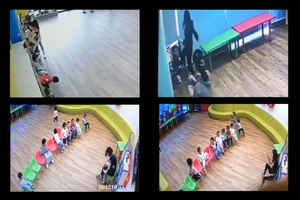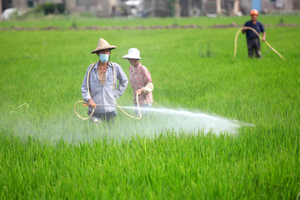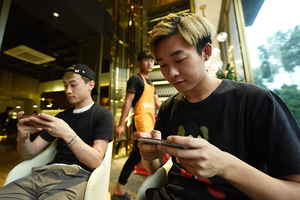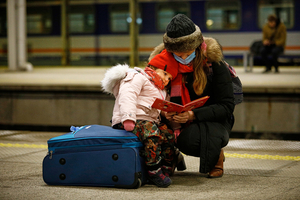Teens Beaten, Whipped and Locked Up in ‘Dark Room’ at Digital Detox Camp
(Nanchang, Jiangxi province) — A sightseeing trip to the southern city of Nanchang with his mother in June turned into a nightmare for Wang Yu* when their tour bus stopped in front of Yuzhang Academy, a reform school for internet addicts.
Wang said he was about to step out of the bus when several muscled men grabbed him and “subdued” him.
“I thought I was being kidnapped, then I noticed my mom walking away without looking back even once,” the 14-year-old told Caixin.
Earlier this month, authorities ordered the school, in eastern China’s Jiangxi province, to close and revoked its license after former students went online will allegations of abuse, including repeated beatings and week-long stints in solitary confinement. The local government in Qingshanhu district has confirmed the allegations.
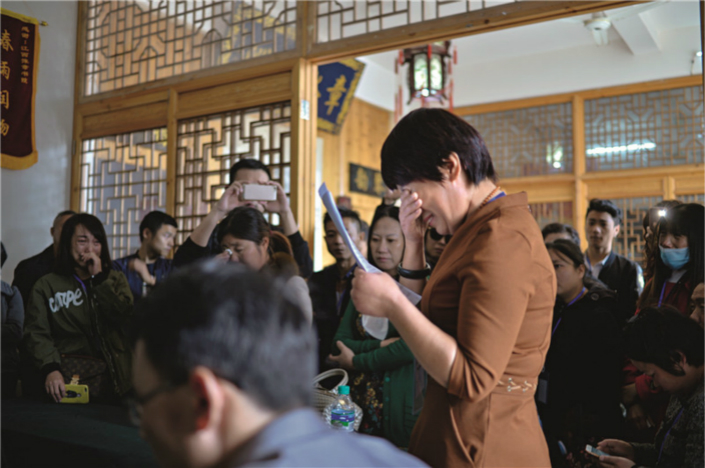 |
During a meeting between parents and school administrators on Nov. 5, a mother breaks into tears as she recounts how her child changed after studying at Yuzhang Academy. Photo: Caixin |
Wang, who returned home in late October, had lost 25 kilograms (55 pounds) in four months. He hardly talked to anyone — even his mother — and he now carries a knife around with him at all times. “Then no one can hurt me, ever!” he said.
The former eighth grader, from the northern city of Dalian, is among dozens of teens who have been physically and emotionally scarred from abuse and mistreatment at Yuzhang College, a Caixin investigation found. Desperate parents had turned to the academy as a last resort because schools, community centers and government social services departments lacked the resources to help teenagers with addiction problems.
The facility was run by private investors in an old Confucian-style school building, where Chinese classics were taught in the past. Its marketing brochures say its “morality training program” aim to inculcate traditional values including “obedience and filial piety.” Parents like Wang’s mother who felt “a filial child is born under the rod,” as the traditional saying goes, turned a blind eye to the school’s methods.
After he was manhandled by the school staff on the first day, Wang says he was locked up for a few hours before being thrown into “the dark room,” where he stayed for a week. This was the school’s “orientation ritual.” It is eerily reminiscent of violent inmates being put into solitary confinement.
The room stank of urine. It had no bed, only a dirty quilt and a pillow thrown on a concrete floor next to an open pit, which served as a toilet. Wang said he once woke up to find a rat gnawing his pillow.
“I was so scared and desperate that I cried all day, but there was nobody I could talk to and no one responded to my pleas for help,” he said.
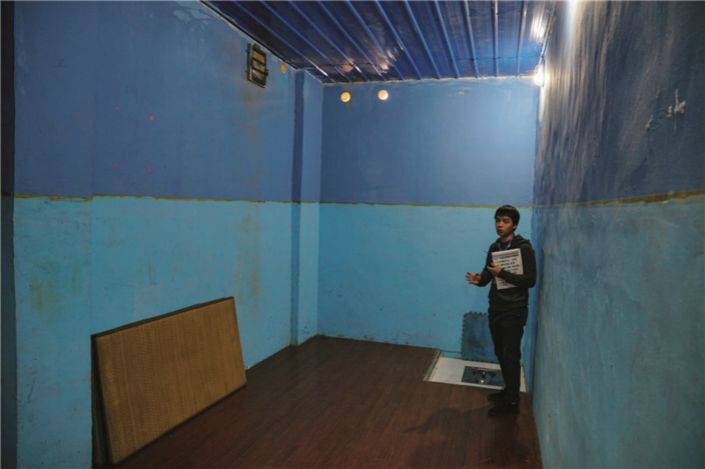 |
Before the Nov. 5 meeting between parents and school administrators, Yuzhang Academy refurbished the “dark room” where it forced new students to stay during their first week at the reform school. Photo: Caixin |
Corporal punishment was pervasive on campus where students were hit on the hand with stainless steel rulers for “minor offenses” such as wearing wrinkled clothing, leaving hair on the dormitory floor or slurping while eating. Students were flogged for arguing with teachers, running away from the center, or getting into a romantic relationship with another student, Wang said.
He said he once saw a girl being stuck 30 times for talking back to a teacher. The principal was present when an instructor used a “dragon whip” made of bamboo and coated with plastic to deliver repeated blows.
She cried out each time she was struck, according to Wang Yu.
Students were given meals with no meat, and some dishes that tasted rancid, according to Liu Lili, another former student who stayed at the facility for a few months in 2014.
Several students fell ill after eating undercooked fish one day in May 2014, but they were only told to drink a bottle of calcium solution, similar to those used for intravenous injections, Liu said.
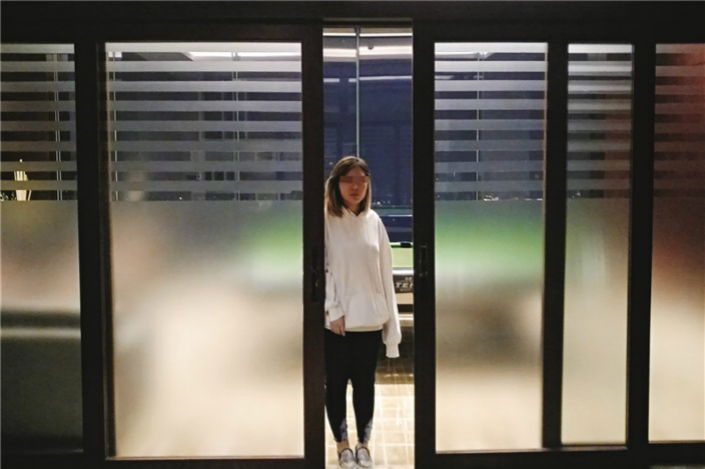 |
This former Yuzhang Academy student from central Henan said she was both flogged with a bamboo staff and hit with a stainless steel ruler by school instructors. Her parents sent her to the reform school for being indifferent about her studies. Photo: Caixin |
Wang wasn’t the only one who tried to commit suicide at the school.
Dai Ying, another former student, said she had entered into a suicide pact with a friend while the two girls were locked up in the “dark room.”
“We tried to suffocate each other with a quilt, but failed,” said Dai, a Chinese-Australian from Sydney.
Her parents sent her to the facility in 2015 when she was 15 years old, because they were concerned about her occasional use of marijuana.
“I just couldn’t understand why my parents would send me to a place like this,” she said. “I might be rebellious, but don’t deserve such punishment.”
She said she was whipped 30 times after she was caught sneaking out of the school’s TV room with a boy, instead of watching the prime-time news on China Central Television every night. It was mandatory for all students to watch the politically charged program.
Most children were tricked into coming to the facility by their parents, while a few were even abducted by guards from Yuzhang Academy with consent from their parents, Caixin found.
The school kept police uniforms and handcuffs in its office and used them to “bring students in” when requested, a teacher, who only gave his surname as Tian, told Caixin.
Officials from Yuzhang Academy declined to respond to Caixin’s questions on the alleged abuses. But its principal, Ren Weiqiang defended the practice of keeping students in solitary confinement for a week in an interview on Nov. 5, saying it was inspired by a Japanese invention method known as Morita therapy, which recommends “seclusion and rest” before the starting to rehabilitate addicts.
The alleged abuses and mistreatment of students at the school came to light in late October after an activist with the online name “Wenrou” interviewed Wang Yu and posted his story on Zhihu, a website similar to Qoura. The story encouraged more students who had been allegedly abused to come forward.
The public outcry that followed pushed the Qingshanhu district government to investigate the irregularities. In a joint statement on Nov. 3, the district’s education and civil affairs authorities ordered the school to shut down and promised to hold the principal and other staff to account pending a further investigation.
This was a sharp reversal from an earlier conclusion, in which the local authority dismissed such abuse allegations brought up by former students in late June when the authority said there wasn’t enough evidence to support such complaints.
Tip of the iceberg?
Yuzhang Academy is just the tip of the proverbial iceberg, as similar institutions can be found all over China. That’s because China’s Law on Preventing Juvenile Delinquency, parents are allowed to send their children to corrective facilities that can help change behavior deemed anti-society, said Yao Jianlong, a professor of criminology at Shanghai University of Political Science and Law.
However, this system is prone to abuse by “rogue operators keen on exploiting incompetent parents,” who often send their children away after failing to guide them on issues such as internet addiction, he said.
Last year, a reform school in Linyi, Shandong province, made headlines after it was revealed that staff administered electroshock therapy to “cure” more than 6,000 young patients. But despite the scandal, little has been done to improve oversight on such facilities.
A business woman who used to run three corrective education facilities in the provinces of Sichuan and Hunan said she charged each student 30,000 yuan ($4,553) in tuition for six months and 50,000 yuan for an eight-month program.
“We could easily earn 4 million yuan in revenue — with at least half of that being profit — if we had 60 students at any given time throughout the year,” said the woman who asked not to be named.
“I’m not proud of what I did, and I’m no longer in the business,” she added.
“But, I treated the students fairly well, and I wasn’t trying to cut corners by spending less on meals, or reducing the spending on staff salaries. Otherwise I could have pocketed 80% of the revenue,” she added.
After abuses at Yuzhang Academy were exposed, students from two other rehabilitation centers in the same city, Nanchang Chuangneng School and Nanchang Hongjie Juvenile School, told Caixin that they were mistreated by staff. Caixin couldn’t independently verify these claims. However, a spokesperson for the Nanchang Education Bureau said that these two schools didn’t have licenses to offer corrective education. They have been allowed to remain open until now because of the high demand for such services, he said.
Surprise reaction
Lax regulations and parents’ willingness to blindly trust these centers have allowed school authorities to use heavy-handed tactics without any repercussions for years. What’s more surprising is how parent’s reacted once the alleged abuses at Yuzhang were exposed.
During a meeting with school staff on Nov. 5, some parents accused children’s rights activists and journalists of sensationalizing the story and demanded the school remain open as they didn’t have another place to send them.
Caixin spoke to more than a dozen parents on campus and found that a majority of students either lived with a single parent or had a violent father, or were left in the care of grandparents or relatives as their parents were working away from home.
Some experts say schools like Yuzhang Academy have flourished because it’s seen as a “quick-fix” for deeply rooted family issues. “The behavioral problems in teens in reform schools are a reflection of bad or missing parenting,” professor Yao said. “It’s the parents who need corrective education, not the children.”
Misunderstandings could also stem from a generation gap, and parent’s eagerness to have their teenagers conform to a “stereotype” of an obedient child.
Wang’s mother told Caixin that she had a strained relationship with her husband and her son had little communication with his father. “He often skipped classes and stayed locked up in his room playing video games and eating nothing all day,” she said. “I was at my wits’ end and decided to send him to Yuzhang College to get help because there wasn’t any other alternative.”
She said she has apologized to Wang several times after she learned about what her son had gone through at the school.
Wang said he no longer felt that he was living in fear after coming home. “I’ve forgiven my parents,” he said. “But the trust is gone.”
*All the students quoted in the story have been given a pseudonym to protect their identities
Contact reporter Li Rongde (rongdeli@caixin.com)

- GALLERY
- PODCAST
- MOST POPULAR



